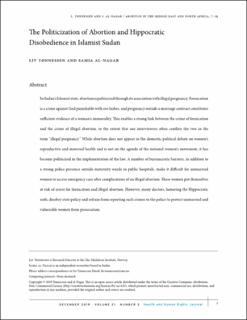The politicization of abortion and hippocratic disobedience in Islamist Sudan
Journal article, Peer reviewed
Permanent lenke
https://hdl.handle.net/11250/3028481Utgivelsesdato
2019-12-01Metadata
Vis full innførselSamlinger
- Publications [1488]
Originalversjon
in Health and Human Rights Journal vol. 21 no. 2 pp. 7-19Sammendrag
Abstract In Sudan's Islamist state, abortion is politicized through its association to illegal pregnancy. Fornication is crime against God punishable with 100 lashes. Pregnancy outside a marriage contract constitute sufficient evidence of the woman's immorality. This enables a strong link between the crime of fornication and the crime of illegal abortion, to the extent the terms interchangeably in the Sudanese context. While abortion does not appear in the domestic political debate on women's reproductive and maternal health and is not on the agenda of the women's movement, it is politicized in the implementation of law in government hospitals. There are a number of bureaucratic barriers in place to prevent illegal abortion alongside a strong police presence outside maternity wards in government hospitals. Honoring the hippocratic oath, doctors disobey state policy, refraining from reporting illegal pregnancies to the police to protect unmarried and vulnerable women from prosecution. Introduction Unsafe abortion is one of the leading causes of maternal mortality, and abortion-related maternal deaths are generally higher in countries that restrict women’s access to induced abortion. In the Middle East and Northern Africa (MENA) region, only Tunisia and Turkey have legalized abortion on demand during the first trimester. Most abortion laws in the region are punitive, and legal services are restricted. In Sudan’s Islamist state, induced abortion is a crime except when performed to save the pregnant woman’s life, if the fetus has died in the woman’s womb, and in cases of rape. In this article, we explore the political dynamics driving the criminalization of abortion in Sudan and its effects on women’s access to abortion-related care in Khartoum. The criminalization of abortion forms an important part of the Islamist government’s restr
Serie
Health and Human Rights Journal vol. 21 no. 2Health and Human Rights Journal vol. 21 no. 2
